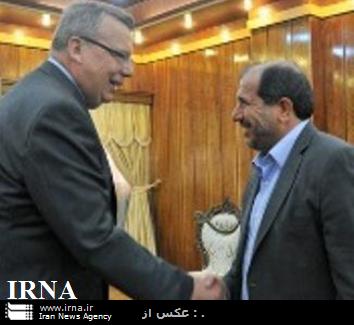ID :
277685
Tue, 03/12/2013 - 11:35
Auther :
Shortlink :
https://www.oananews.org/index.php//node/277685
The shortlink copeid
Iran-UN Share Views On Ways To Fight Drugs

Vienna, March 12, IRNA – Iran and the Untied Nations share views on ways of struggling narcotics use.
In the UN world meeting here, Iran and the international body stressed the need to adopt a comprehensive approach to settle the problem of narcotics in Afghanistan by giving priority to programs in the country’s development plan which would substitute narcotics production.
During the meeting, Iranian Interior Minister Mostafa Mohammad Najjar who is here to attend the 56th annual session of the Commission on Narcotic Drugs, offered five guidelines to fight drugs abuse.
He highlighted the need to adopt an all-inclusive strategy to put an end to production of drugs in Afghanistan by giving the priority to replacement of poppy cultivation with other crops.
He also called for aggravating activities to close down drugs-related laboratories there.
A UN official shared Iran’s views on the issue by proposing a similar issue to the meeting.
The Iranian minister, who also heads the country’s anti-drugs body, also stressed the necessity of avoiding parallel operations, concentrating on the joint responsibility of all world countries and contribution and collaboration of all countries in both regional and international plans to fight drugs problems.
He called for mobilizing present capacities of governments to pay due attention to the principle of common responsibility of all countries.
The 56th session of Commission on Narcotic Drugs (March 11-15) kicked off in Vienna on Monday.
Najjar addressed the session and met with his counterparts and heads of the participating delegations to discuss issues of mutual interest.
He also had tripartite meetings with Afghan and Pakistani officials.
The Vienna session was the third Ministerial Conference of the Paris Pact Partners on Combating Illicit Traffic.
The first such meeting was held in Paris in 2003, with the second hosted by Moscow in 2006.
The Paris Pact is one of the most important frameworks in the fight against opiates originating in Afghanistan (hereafter referred to as “opiates”). About 60 countries are signatories to the pact.
It is aimed at reducing illicit traffic in opiates including opium poppy cultivation, production and global consumption of heroin and other opiates, and at establishing a broad international coalition to combat illicit traffic in opiates. It relies on the commitments and ambitions of its partner-countries working in consultation with the United Nations Office on Drugs and Crime (UNODC) and in full conformity with the three international drug control conventions and the Political Declaration and Plan of Action adopted by the High-level Segment of the Commission on Narcotic Drugs in March 2009.
Despite continued efforts by the international community and major achievements, the problem of illicit traffic in opiates continues to be of serious concern.
Illicit traffic in opiates, including heroin, is a growing problem, generating illicit financial flows, fueling corruption, and organized crime and in some cases funding terrorist activities and insurgency.
Paris Pact partners, recognizing their common and shared responsibility reiterate their determination to counter the sustained menace of illicit drugs, which causes widespread harm and suffering, and endangers the health and welfare of human beings and adversely affects the social, economic, cultural and political foundations of society.
The Third Ministerial Conference of the Paris Pact Partners was held in accordance with decisions taken at the first (Paris, May 21-22, 2003) and second (Moscow, June 26-28, 2006) Conferences, where foreign ministers of 55 states and heads of 23 international organizations spoke in favor of holding such ministerial meetings on a regular basis.
The goal of this ministerial conference was to reaffirm the commitments of members of the international community towards the fight against illicit traffic in opiates, to strengthen cooperation between Paris Pact partners and to urge them to achieve substantial practical results in reducing illicit opiates trafficked from Afghanistan./end





